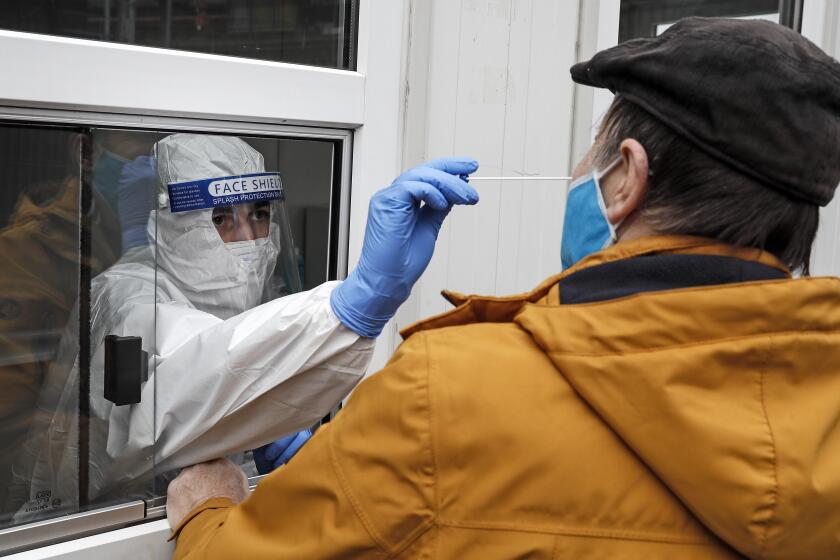Confirmed coronavirus cases top 40 million worldwide

- Share via
LONDON — The number of confirmed coronavirus cases across the planet now exceeds 40 million.
The milestone was passed early Monday, according to Johns Hopkins University, which collates reporting from around the world.
The actual worldwide figure of coronavirus infections is likely to be far higher, because testing has been variable, many people have had no symptoms and some governments have concealed the true number of cases.
To date, more than 1.1 million confirmed COVID-19 deaths have been reported, although experts believe that number, too, to be an undercount.
The U.S., Brazil and India have reported by far the highest numbers of cases, although the increase in recent weeks has been driven by a surge in Europe, which has seen more than 240,000 confirmed COVID-19 deaths so far.
Last week, the World Health Organization said Europe had reported a record weekly high of nearly 700,000 cases and said that the region was responsible for about a third of cases globally. Britain, France, Russia and Spain account for about half of all new cases in the region.
Chancellor Angela Merkel has urged Germans to unite like they did in the spring to slow the coronavirus spread after another daily record of new cases.
The WHO said new measures being taken across Europe — including new requirements on mask-wearing in Italy and Switzerland, the closure of restaurants and bars in Northern Ireland and Belgium, a nighttime curfew in France and targeted lockdowns in parts of Britain — are “absolutely essential” to stop COVID-19 from overwhelming hospitals.
The agency said several European cities could soon see their intensive care units overwhelmed and warned that governments and citizens should take all necessary measures to slow the virus’ spread, including bolstering testing and contact tracing, wearing masks and following social-distancing measures.
The WHO has previously estimated that about 1 in 10 of the world’s population — or 780 million people — have been infected with the coronavirus, more than 20 times the official number of cases.
Some researchers have argued that allowing the virus to spread in populations that are not obviously vulnerable will help build up “herd immunity” and is a more realistic way to stop the pandemic instead of the restrictive lockdowns that have proved economically devastating.
As it did over the migration crisis in 2015, the Scandinavian country took a COVID-19 position distinct from its European neighbors.
But WHO Director-General Tedros Adhanom Ghebreyesus has warned against the belief that herd immunity might be a viable strategy to pursue, saying that this kind of protection needs to be achieved by vaccination, not by deliberately exposing people to a potentially fatal disease.
“Allowing a dangerous virus that we don’t fully understand to run free is simply unethical,” Tedros said last week.
The U.N. health agency said it hopes there might be enough data to determine if any of the COVID-19 vaccines now being tested are effective by the end of the year. But it warned that first-generation vaccines are unlikely to provide complete protection and that it could take at least two years to bring the pandemic under control.
More to Read
Sign up for Essential California
The most important California stories and recommendations in your inbox every morning.
You may occasionally receive promotional content from the Los Angeles Times.















